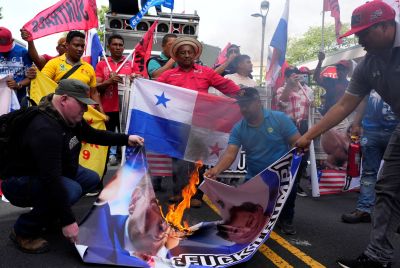Obama, Medvedev may get arms deal in principle
WASHINGTON - President Barack Obama and Russian President Dmitry Medvedev could reach an agreement in principle on nuclear arms reduction in Copenhagen on Friday, leaving it to negotiators to finalize a deal in coming days, a senior U.S. official said.
With Washington and Moscow still grappling over a few key differences, the official insisted there was little chance the leaders would be ready to sign a finished accord when they meet on the sidelines of a global climate change conference.
But if the presidents are able to come to terms on the remaining verification issues, it might be possible to reach an agreement in principle which will still require the negotiating teams to finalize, the official said in Washington.
There were no guarantees, however, that the Copenhagen talks would yield a provisional accord, given the latest signs of tension in U.S.-Russian negotiations in Geneva despite the White House's insistence that good progress was being made.
The talks in the Danish capital follow Russia's call on Thursday for simpler verification procedures for planned cuts in nuclear weapons arsenals, while Washington insisted it wanted a deal that worked for both former Cold War foes.
It's high time to get rid of excessive suspiciousness, Russian Foreign Minister Sergei Lavrov told reporters in Moscow earlier in the day.
Talks between the world's two largest nuclear powers to find a replacement for the 1991 Strategic Arms Reduction Treaty, or START-1, have stumbled in recent weeks, although both sides have said they expect an agreement to be reached in the near future. START-1 was the biggest pact to cut nuclear weapons in history.
White House spokesman Robert Gibbs said earlier the discussions were making good headway but that the United States was not interested in doing a deal for its own sake.
We want something that works for both sides. We're going to work on this agreement until we get it right ... it doesn't make sense to get something just for the sake of getting it if it doesn't work for both sides, he said in Washington.
Obama and Medvedev had sought a new treaty by December 5, but that deadline passed and the old accord was extended indefinitely while negotiators in Geneva try to forge a new pact. An Obama administration official said on Wednesday arms negotiations were likely to extend into 2010.
On Thursday, another U.S. official, speaking on condition of anonymity due to the sensitive state of discussions, raised the prospect Obama and Medvedev might set parameters to guide negotiators in working out final details and set a deadline for them to do so. The official declined to elaborate.
TENSIONS SURFACE
Tensions came to the surface on Thursday.
In the last couple of days we have noticed some slowing down in the position of U.S. negotiators in Geneva, Lavrov said earlier. They explain this by the need to receive additional instructions. But our team is ready for work.
Gibbs denied Washington was dragging its feet.
Lavrov, whose ministry is leading the negotiations together with the U.S. State Department, said a deal was unlikely to be signed this weekend in Copenhagen.
Both sides say finding a replacement to the START-1 treaty would help reset relations between Moscow and Washington that had sunk to a post-Cold War low in recent years.
Negotiations in Switzerland have been proceeding under unusually tight secrecy and neither side has given a clear explanation for the delay in finding a deal.
The START-1 treaty, signed in July 1991 by U.S. President George H.W. Bush and Soviet leader Mikhail Gorbachev, took nearly a decade to achieve but under the deal both Russia and the United States more than halved their nuclear arsenals.
Obama and Medvedev said at a Moscow summit in July they wanted a new treaty that would reduce operationally deployed nuclear warheads to 1,500 to 1,675, a cut of about a third from current levels.
They also agreed that strategic delivery systems -- the missiles, bombers and submarines that launch nuclear warheads -- should be limited to between 500 and 1,100 units.
Lavrov said he hoped the cuts in the new treaty would be as drastic as possible but added that verification procedures, which were extremely strict under START-1, should be made less complicated and less costly.
Precise figures on deployed nuclear weapons are secret, but the U.S.-based Bulletin of the Atomic Scientists estimated at the start of 2009 that the United States had about 2,200 operationally deployed nuclear warheads and Russia about 2,790.
(Additional reporting by Conor Sweeney in Moscow and Alister Bull in Washington; Editing by Peter Cooney)
© Copyright Thomson Reuters 2024. All rights reserved.





















